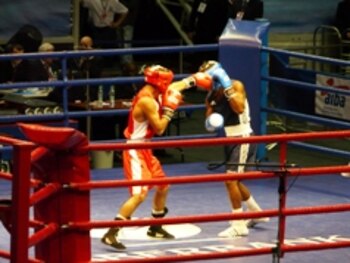
(ATR) Despite election of a reform president two years ago, international boxing federation AIBA faces new battles to stem corruption. Suspensions and other penalties have been handed down against 15 officials from around the world for charges that include drug smuggling and theft of AIBA money.
The wave of allegations are detailed in a November memo President C.K. Wu sent to the national federations that reported on cases the AIBA Ethics Commission is reviewing. It may be the most extensive housecleaning ever for an Olympic sports federation.
Wu, IOC member from Chinese Taipei, took office in November 2006. He won a sharply divided vote that ousted 20-year incumbent Anwar Chowdry. The Pakistani sports leader ended his career at AIBA overshadowed by charges of corruption in the federation's management and notorious examples of bad judging at matches from regional competitions to the Olympics.
Unhappy with the state of affairs at boxing, the IOC in 2005 suspended more than $1 million in payments due to the federation from its share of TV rights from the Athens Olympics. The IOC demanded reform in AIBA administration as well as the way the federation handled the judging of matches.
Wu won office as reformer and was able to take action against Chowdry as well as some other individuals closely associated with the former AIBA president. Wu also enacted judging reforms and other changes aimed at restoring the integrity of match results. IOC President Jacques Rogge praised Wu for his work and the IOC restored its funding for the federation.
But as he enters a third year in office, Wu faces new challenges to his authority. The 15 ethics cases involve allegations taking place under Wu's administration, not Chowdry's. Six of the cases involve members of the ruling executive committee, three of whom have been suspended.
Charges include attempts to manipulate the results of regional boxing tournaments or harassment of officials at the tournaments.
The former chairmen of two AIBA commissions are accused of taking money from the federation. Former Finance Commission chair Adi Narayan of Cook Islands has admitted to taking $19,000 but has not indicated he will repay the money. AIBA is seeking criminal prosecution in the Cook Islands.
Former Medical Commission chair Dr. Ed van Wijk of the Netherlands is also accused of taking AIBA funds with no indication that he will return the money. He was also accused of keeping a laptop computer belonging to AIBA, which has since been returned. But an AIBA official says van Wijk took eight months to respond to requests for information on the missing money and laptop. And according to AIBA, when van Wijk did reply, his response included attacks against the AIBA president and executive director Ho Kim.
Caner Doganeli, the former secretary general of AIBA, was drummed out of the organization in 2007 for failing to account for thousands in federation money. He is now cited in another ethics case for attempting to manipulate elections in October of the Turkish Boxing Federation.
The Turkish federation has been put on notice to explain. Doganeli's expulsion from AIBA last year bars him from any business with the Turkish federation.
The head of the Greek federation was sanctioned for publicly criticizing judging at the Beijing Olympics. AIBA says criticisms should have been handled within the federation before going to the media.
One of the more unusual cases among the 15 handled by the AIBA Ethics Commission banishes the ex-president of the Tanzania Boxing Federation following his imprisonment for drug smuggling charges. The national federation is out of existence as one consequence of the ex-president’s criminality.
And it seems the Chowdry camp still is trying to cause trouble for Wu. Another ethics case involves Greenhill, the Pakistan company run by a Chowdry son-in-law that was the sole supplier of boxing equipment for AIBA-sanctioned events. One of Wu's first acts as president was to sever Greenhill's relationship with AIBA. Since then, however, according to the AIBA Ethics Commission, Greenhill has sent letters around the world attacking Wu and purporting to still be the equipment agent for the federation. Wu has ordered AIBA federations not to do business with Greenhill.
Some of the 15 cases in the ethics commission report face further inquiry; some are pending responses from the accused. Those cases may be dealt with in February when the AIBA EC will meet next in Milan.
AIBA President Wu says he and other AIBA officials have been the subject of ongoing email harassment and other abusive correspondence while these inquiries have been mounted.
"It is really sad to realize how unethical and corrupted people are desperate to survive by causing problems within the current AIBA administration," Wu writes.
"But politics exist in any sports organization and I am willing to accept constructive suggestions and criticisms for our sports development.
"However, I will never tolerate any organized harassment or ill-intended manipulations in order to protect our sport, boxers and organization," Wu says in his letter to the federations.
During a forum on ethics and judging held Dec. 12 in Moscow for federation officials and boxers, Wu urged respect for the integrity of boxing.
"We will not tolerate corruption, we cannot have this in our sport," he said to the audience, reminding them that their personal reputations were at stake as well. And while 15 ethics cases at one time may be some kind of dubious record for a federation, Wu and other AIBA officials believe these may not be the end of efforts to sweep out the old guard at boxing.
Written by Ed Hula.
Últimas Noticias
Boxing’s place in the Olympics remains in peril as IOC still unhappy with the state of AIBA’s reform efforts
The IOC says issues concerning governance, finance, and refereeing and judging must be sorted out to its satisfaction. AIBA says it’s confident that will happen and the federation will be reinstated.

McLaren report to FIBA confirms abuses in the Mali women’s basketball program
The investigation could not “independently verify” allegations against FIBA president Hamane Niang, who has resumed his duties after stepping aside during the probe.

ATR Extra: 1st ISF U15 World School Sport Games – Belgrade 2021
Olympic Channel is live streaming the basketball, basketball 3x3, football, judo and wrestling competitions during the event, which runs September 11-19.

International Judo Federation bans Algerian athlete and coach for 10 years for refusing to fight an Israeli at Tokyo 2020
Judoka Fethi Nourine and his coach Amar Benikhlef admitted they were withdrawing from competition to avoid a potential match with Tohar Butbul of Israel.

IIHF bans Belarus hockey president for five years for code of conduct violations - Federation Focus
Also: no contested election for next ITTF president; BWF calendar shrinks as event in India cancelled due to pandemic; FISU announces early bids for 2027 and 2029 World University Games



